How to Use Solar Energy to Charge Your EV
- Why a solar EV charger makes sense
- Home charging costs
- Cost of a solar electric car charger and solar system
While home charging is the most cost-effective way to charge your electric vehicle, pairing it with a solar EV charger can bring the price down even more. Depending on the size of your solar array, you could potentially cover the energy needs of your EV and your home. For smaller households, it may be a case of choosing to use the energy to charge your EV or power your home.
This article will look at how much it costs to operate a solar EV charger, the costs associated with EV charging and the benefits. With free energy available through solar power, it’s a logical step to take when thinking about charging an EV.
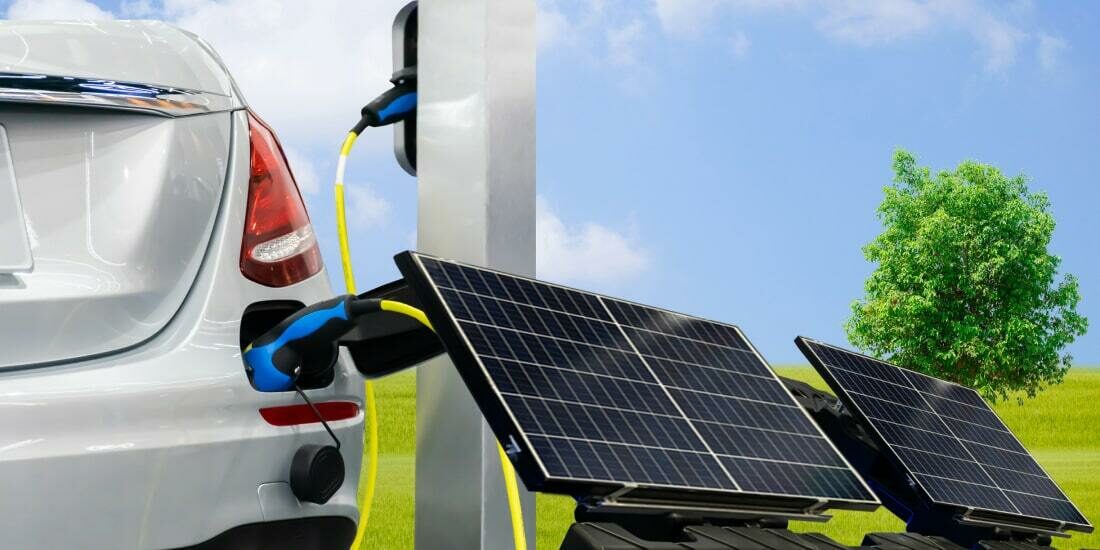
What's On This Page?
Click the links below and head straight to a specific section of the article.
Home Charging Is Best
Even though you are able to charge your car at a public charge point using slow, fast and rapid chargers, they each come with their own price tag, with a premium attached to the convenience of quicker charges. Home charging, on the other hand, will offer you one speed but will only cost you domestic energy prices. It might take 30 minutes to charge or 12 hours, so it might be beneficial to look at overnight charging. If you’re able to make use of a solar EV charger, the operating costs will decrease.
Smart home chargers exist, which are able to make sure your EV is only charging when you’re on an off-peak period. While EV tariffs have been around with energy companies for a while, a lot of them have pulled them from the market for new customers because of the current energy crisis. To get around this, having a solar EV charger, where you can utilise your own renewable energy to charge your car, is a must-have. For more information on home EV charging, see our accompanying guide.
EV Charging Costs
According to Energy Saving Trust, you can expect to see the following costs for EV charging.
Action | Cost |
Charging at home for 10,000 miles a year | £523 |
Charging at a public charge point for 10,000 miles a year | £1,298 |
Charging 70% at home and 30% at a public charge point | £756 |
Average annual petrol cost | £1,555 |
The average annual petrol cost is even more expensive than solely charging your EV at a public charge point, but the benefits of home charging are only too obvious. To help provide real-world data, we’ve compiled a graph using costs from the Energy Price Guarantee. Using data from Leccy, we can show how much it costs to charge various EVs at home during the energy crisis.
This is assuming home charging costs of 24p/kWh based on the April 2024 price cap, and takes into consideration the previous 27p/kWh in October 2023 and the previous 28p/kWh in January 2024. The interactive graph shows the price when charging from 0-100%.
Considering the average price to fill up a petrol car is around £72, even the most expensive EV to charge on the list is not even £23. There is a real incentive to charge your EV at home, and as you can subsidise this cost with free, natural energy, a solar EV charger can offer even more real-life savings.
How a Solar Electric Car Charger Works
A solar EV charger allows you to utilise the energy you generate through your solar panels to charge your electric car. There are a couple of ways to do this. If you are at home for most of the day, your EV can be charged using solar power as soon as it’s generated. Otherwise, if you need to charge overnight, a solar battery will need to do the heavy lifting for you. The battery will store any energy generated during the day for use when the sun has set.
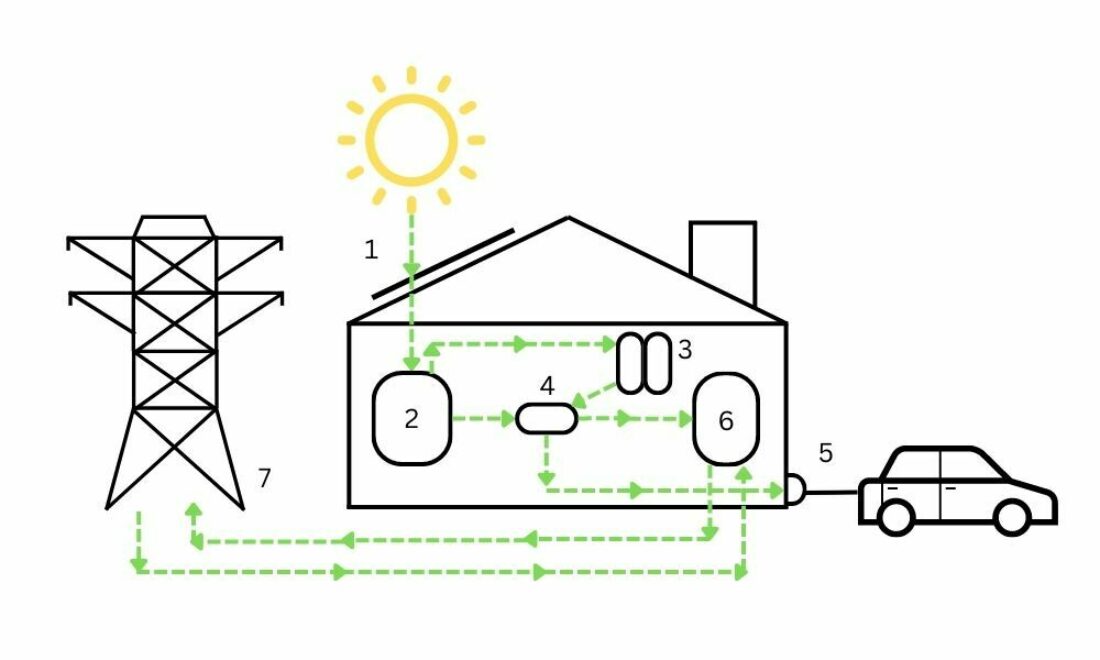
This diagram shows the transition of solar power as it goes through your home system. After solar power is captured (1), it passes through an inverter (2) to convert the current from DC to AC in order to be usable. If you have a solar battery, any surplus is stored here (3), where you can use it later, otherwise the consumer unit (4) distributes the energy where it’s needed, either powering the home or charging your EV (5). Your import/export meter (6) keeps stock of how much energy is generated and exported to or imported from the grid (7). If you’re using your solar EV charger to charge your car at night, the energy will come directly from your solar battery.
Depending on your solar array, you might even be able to power both your home and charge your EV. This is also conditional on the size of your EV battery, as larger EVs will take more power to charge. The capacity of the smallest EVs is around 100 miles, while medium EVs tend to be at least 50% more than this and top-end EVs can be up to 400 miles. This gives a better indication of how many panels you’ll require for a solar EV charger.
Usually, ten solar panels can be enough to charge an EV, but this is an average that won’t take into consideration your home’s energy demand or capacity of your EV. In some cases, it might be a balance between charging your EV or utilising the electricity for your home. Even in an either/or scenario, a solar EV charger is beneficial as it will still cut your total electricity demand and bill.
Are EVs Still Cheaper to Run Without a Solar EV Charger?
Using the data from our graph above, it’s clear that EVs are still cheaper to run than petrol and diesel cars, despite the energy crisis. Domestic electricity is now 24p/kWh since the April Ofgem price cap. Although this has decreased home charging prices slightly, petrol is at an average of 144p and diesel at 151p. To put it into perspective, a Renault Zoe EV will cost 6.6p per mile, while a Vauxhall Corsa petrol model will cost 17p per mile. This could be even lower (or free) if paired with a solar EV charger.
How Much Does a Home Solar EV Charger Cost?
Direct solar EV chargers don’t yet exist, so you aren’t able to buy them outright. You will have to purchase a home EV charger as well as a solar panel array for your home and then make sure the two systems are connected before you can utilise it. A single solar panel can cost around £400, while a home EV charger can cost between £250 and £800.
Fortunately, you can make use of the government’s EV chargepoint grant, which provides up to 75% off the installation of a solar EV charger. This is capped at a maximum of £350, but can go a long way to the cost of a top of the range home charger. There are no government grants for installing solar panels or solar batteries, so these are bigger upfront costs that you will have to bear yourself.
Before direct solar EV chargers become commercially available, some companies have come up with an inverter that can charge your EV using solar power as it’s generated. This cuts out the need for separate inverters and for power to be switched to the solar battery and back again. Your electric car will essentially plug straight into your solar panels.
Benefits of a Solar EV Charger
If you can get past the price of benefitting from solar power in your home, you can expect to see the many benefits of a solar EV charger outlined below.
Reduce your carbon emissions
Lower your reliance on the national grid
Capitalise on free, renewable energy
Add value to your home, with a complete solar array to suit your energy needs
Make money by renting it out
Not only is a solar EV charger a carbon free technology, you’ll receive cheaper electricity bills and it will reduce your dependence on the national grid. It can also add value to your home, by around 14% for solar panels and 13% for EV chargers. A full solar system with batteries included has the potential to add massive value to your home.
You’re also able to make money through a solar EV charger if you rent it out when you’re not using it. By signing up to a suitable app or service, you can advertise your charger’s availability and prices. Even if you aren’t able to benefit from any solar power generated throughout the day, you can still generate a form of income from it.
Related articles
View all EV charging articles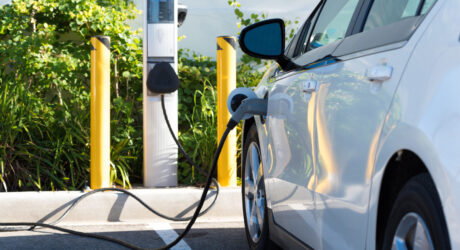
A Guide to Electric Car Batteries

EV Home Charger Installation Guide: How to Charge an EV at Home
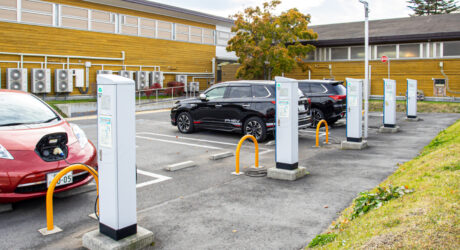
OZEV Grant: What Is It and Am I Eligible?

The Best Apps for Finding EV Charging Stations
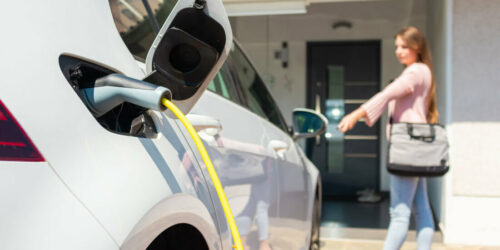
Electric Car Home Charging Stations: The Top Ten EV Chargers for Your Home

Should I Buy a Used Electric Car?
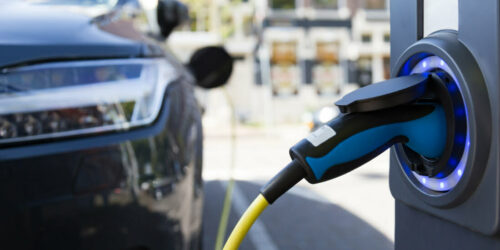
Electric Vehicle Range







